Ufonia, an innovative Oxford-based digital health company, has built Dora – an autonomous telemedicine assistant – for use in routine clinical conversations. As an alternative to hospital visits where clinically appropriate, it increases clinical capacity, reduces provider costs, improves patient convenience and eases demand on healthcare staff. Dora is accessible and easy to use – patients simply receive a regular telephone call, they do not need new devices, apps or training and they avoid travelling to an appointment. It is suitable for everyone regardless of their access to or knowledge of technology.
Dora is focused on operational bottlenecks, particularly high volume, low complexity care that makes up the bulk of the current backlog in clinical activity. It is a like-for-like replacement for a follow-up call from a doctor or nurse, providing a reliable, consistent check. By digitally capturing conversations with patients, detailed data can be made available to review outcomes following surgery. Calls can be scheduled for multiple times to track progress and intercept problems.
Health Innovation Oxford & Thames Valley (HIOTV) has been involved in the project since its early stages in 2018 and has worked closely with Ufonia to explore their potential customer base, value proposition, articulate their business model and identify the clinical challenge that they are looking to solve. In support of the launch and discovery phase, the HIOTV performed a study to explore Dora’s utility in clinical practice and the potential barriers to adoption. Clinical stakeholders were interviewed about how the technology would integrate into the care pathway. The results were discussed with clinicians and commissioners to gain insights into how the potential barriers could be overcome. A health economics model was developed comparing the cost of the Ufonia platform with the current standard care (nurse-led telephone calls) at Buckinghamshire Healthcare NHS Trust (BHT). The structured qualitative and quantitative analysis provided robust conclusions which have been an invaluable evidence-based reference document helping Ufonia gain further interest and investment.
HIOTV also explored patients’ experiences of the existing pathway and their views on the use of this novel autonomous telemedicine system. Findings from this exercise highlighted the importance of including AI at the right stage of the pathway and the potential advantages and disadvantages as seen by patients. The findings are being incorporated into future iterations. Ufonia has grown from 2.5 full time equivalent (FTE) employees to 8 FTE and three part-time employees over the past year, both safeguarding and creating jobs within the Oxford area. Ufonia underwent an Angel investment last year and is currently raising a further seed round. Ufonia has also leveraged the partnership with the HIOTV to secure interactions with other potential stakeholders such as investors, grant bodies and NHS bodies.
The initial focus has been on the most common operation in the NHS – cataract surgery (400,000 procedures every year in the UK) – particularly post-operative calls to patients. Dora has since been rolled out to further NHS sites. Funded by a Phase 2 NIHR/NHS AI in Health and Care Award, Ufonia will develop evidence supporting the safe deployment of Dora to deliver routine clinical follow-up calls at two large NHS hospital trusts – Imperial College and King’s College, London.
Ufonia has also leveraged the partnership with the HIOTV to secure interactions with other potential stakeholders such as investors and grant bodies. A Harwell HealthTec Cluster Proof of Concept Award (£20,000) allowed Ufonia to develop and test a pilot version of Dora supported by an additional £25,000 from the Science and Technology Facilities Council (STFC). The project focused on assessing outcomes following knee surgery using the Oxford Knee Score. The HIOTV provided support as part of an Innovate UK Digital Health Technology Catalyst feasibility grant (£75,000) to develop the value proposition and identify their beachhead market from a range of potential options, focusing on ophthalmology in BHT. Ufonia then collaborated with My Clinical Outcomes, Oxford University Innovation (OUI), STFC, BHT and HIOTV to bid successfully for Digital Health Technology Catalyst funding (£665K) to support the launch and discovery phase focusing on follow-up post cataract surgery. The HIOTV supported Ufonia’s successful application for funding from the AI in Health and Care Award in 2020.
In addition, the HIOTV is focusing on how this AI solution can be incorporated effectively into triage of head and neck cancer, working to ensure this is informed by patient views and experience. This will include focus groups and roundtable discussions. It follows Ufonia’s success in securing additional funding of almost £100,000 through the SBRI Healthcare Greener NHS award in January 2022.


